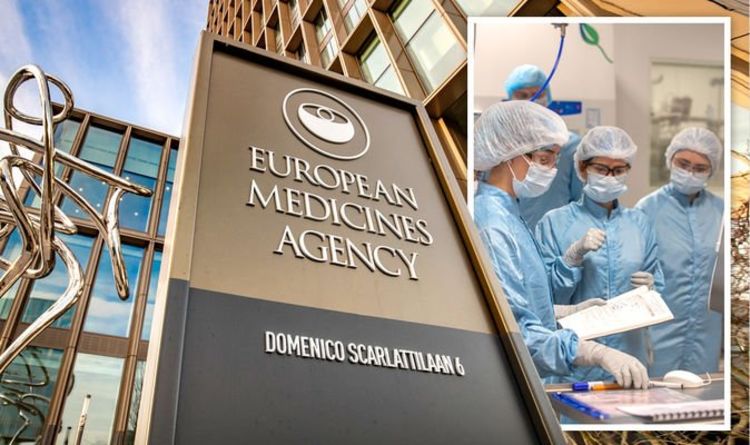Vaccines: Europe is ‘so far behind UK’ says professor
When you subscribe we will use the information you provide to send you these newsletters. Sometimes they’ll include recommendations for other related newsletters or services we offer. Our Privacy Notice explains more about how we use your data, and your rights. You can unsubscribe at any time.
Its regulator the European Medicines Agency is seeking to access databases containing information from complex medical studies carried out in the UK. The bloc’s drugs watchdog is planning to spend £868,000 on creating two archives of more than one million records drawn from Britain. According to an official tender document, seen by Express.co.uk, the first will contain “active patient” information to monitor the impact of “drug utilisation to subsequent clinical events”.
The second system will provide the EMA’s experts with “information on hospitalisation episodes, hospital treatments and diagnoses at the patient-level”.
Britain decided to quit the umbrella of the bloc-wide medicines regulator, opting for our own watchdog, the MHRA, to make decisions on healthcare and drugs regulations.
The move has left the EMA without a key player in the international drugs endeavour and its experts need to fill the void.
The tender document states that the EU’s watchdog must have incredibly easy access to the data with very little in the way of restrictions to the private information.
“Availability of information on causes of death, pregnancy status and pregnancy outcomes, including ability to link mothers and babies, through linkages or through providing access to additional databases, is desirable,” the memo states.
It adds: “No restriction on the use of data that could cause avoidable delay in the regulatory actions of the Agency is acceptable.
“Any restrictions in place for the publication of results obtained from analyses of the data should be explained, as well as the possibilities that are available in case publication is needed for public health reason, such as in situations of public health emergencies.”
Since Britain left the EU, the EMA has not stopped collaborating on drugs studies with experts in the UK.
An ongoing example would be in the investigation into whether the AstraZeneca vaccine was responsible for blood clots in people that had received it.
EMA chief Emer Cooke confirmed that her safety committee team had shared their findings with the MHRA, which was also looking into the potential side-effects of the jab, and vice-versa.
MUST READ: EU orders AZ hand over ALL jabs from Dutch plant funded by UK taxpayer
It was found that blood clots were a “very rare” side-effect of the Oxford COVID-19 vaccine.
The EMA was previously based in London before Brexit but was forced to relocate to Amsterdam in the wake of our vote to quit the bloc.
Under the trade and security agreement, both the UK and EU vowed to work closely together on healthcare matters, given that the treaty was signed in the midst of a global pandemic.
DON’T MISS
EU rebellion: VDL ordered not to target UK with draconian jabs ban [INSIGHT]
AstraZeneca vaccine announcement: Van Tam shows risk of harm [CHART]
British expats could be cut from Spain’s vaccine waiting list [REVEALED]
This Morning: Nick Ferrari discusses AstraZeneca vaccine
An annex in the document allows for both sides to recognise “good manufacturing practice” inspections on drugs and other medical goods carried out in each others territories.
The pact also leaves the door open for Brussels to allow market authorisation checks to be carried out in the UK for firms seeking to export life-saving supplies to the Continent.
Express.co.uk has contacted the EMA for comment on the creation of its databases.
Source: Read Full Article


